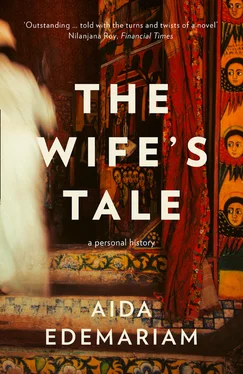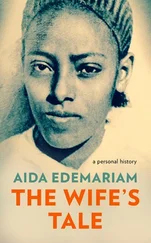– LEGENDS OF OUR LADY MARY THE PERPETUAL VIRGIN AND HER MOTHER HANNA
By the time the attention turned to her, she was in an agony of restlessness. She had tried to concentrate, to follow the familiar shapes of words she did not expect to understand, to feel their practised roll and pitch, to distinguish between the voices, now muttering, now confident and clear. She had tried to stand still; the effort made her aware of each limb, each finger and toe, of her head balanced on her neck, of the netela, so fine it was near weightless, that covered her head like a cowl. If she moved it gave off a faint scent, of sunshine and new-spun cotton, a wide, outside smell that cut across the eddying incense like an opened window.
She wished she was out there now, playing. Sitting on her haunches to throw a smooth round stone into the air, using the same hand to pick up more stones, then intercept the first stone’s descent. Or games that went on and on, till bats swooped and looped through the dusk. Coo-coo-loo! the other children would call, speeding to hiding places. Not yet! she would call back, from her perch on a pile of rocks. Coo-coo-loo! Not yet! Coo-coo-loo – Now! And they would race toward her, vying to touch her skirt and claim themselves safe, making her laugh and laugh. A far better feeling than the time she had ripped up a perfectly good dress to make herself a doll, thinking to strap it to her back as if it were a child. Oh, the whipping she had got then! And the doll had felt too light, lacking the heft of a real baby. It was more fun to play mother with the neighbourhood children. Or weddings, wrapping dolls in scraps of red and green silk and walking them bandy-legged to church.
She shifted, stood still again. The long black cape was lined, the gold filigree around the collar and down the front made it heavy, and it was getting heavier. She hugged herself tight, underneath it. Her stomach was so empty.
The wall of clergy changed position. A book was opened, one wave-edged vellum page at a time. A pause, and a priest looked at her. At once she looked down. Bare toes on a faded, fraying carpet. Hers, theirs. So many of theirs.
Repeat after me. If he is ill – if he is ill. The fact of her voice loud to her. Her breath warm tendrils moving across dry lips, dust swirled along the ground by an afternoon breeze. If he grows thin – if he grows thin. Or darkens – or darkens. If he suffers – if he suffers. Or is in trouble – or is in trouble. If he becomes poor – if he becomes poor. Even if he dies – even if he dies. I will not betray him – I will not betray him. A turn away from her, and another voice, a man’s. If she is ill – if she is ill. If she grows thin – if she grows thin. Or darkens – or darkens. The priest took her right hand and placed it on his cross. Then he took another hand and placed it on hers. I will not betray her.
A ring was threaded onto her third finger, another onto the man’s. It would be years before she understood what she had promised. For the moment all she knew was a thickening of the air, a seriousness, a flutter of – what? Apprehension, perhaps.
More prayers. A prayer for the rings, and a prayer over their capes. A thumb slick with holy oil tracing a rough cross onto her forehead, and a prayer over that. Hands bearing cushions, and on the cushions crowns, high straight-sided traceries of gold. A priest held one aloft for a long moment, then settled it on her head. She stepped back under the weight. Felt the figure next to her receive the weight too. The prayer of the crowns, and only then the church service.
After the bread and the raisin wine, taken under a tilting roof of heavy brocade; after they had bowed to kiss the threshold of the holy of holies; after they had walked slowly around it, once, the priest extended his cross for them to kiss. It was cold, and smelled of earth after rain.
Ililililil! cried the women.
The sun had burned the mist out of the cedars and hurt her eyes, so she had to use her feet to search for the steps of the low, humped building.
Ililililil!
Out here the trilling was thin, echo-less. Cockerels crowed, and crows answered. Kwaa. Kwaa.
Ililililil!
The congregation assembled at the bottom of the steps and began a slow procession around the churchyard. Past the bethlehem, with its protective ring of dark evergreens, its nuns picking through baskets of wheat for the eucharist bread; past a young olive tree, leaves quivering silver. A long, stately walk around a central absence: the foundations of the main church were partly covered over with vines and moss, partly naked, as though they had been exposed yesterday. When the circuit was over the congregation settled under trees to listen to the sermon, and to praise-couplets composed for this day. Then, finally, ‘May He bless you. May He multiply your seed as the stars in the sky, as the sand of the sea. May He make your house rich as the house of Abraham.’
Ililililil! Ililililil!
As they picked their way out of the gate and started down the road she noticed that the streets and alleyways, usually so busy, were silent, that doors were shut tight. Wobbles of woodsmoke, the odd dog foraging among the stones and bones, roosters crowing as always, but otherwise an unnatural hush.
She began to see the holes – ragged holes, punched through sturdy mud walls – and to glimpse the homes inside: raised wooden beds strung with leather, pots and pans, dividing curtains. Once she saw directly through to a front door, barricaded against the disease until the house’s inhabitants could fashion their escape. The women noticed her looking. They drew the netela further about her face, and hurried her on.
And then the feasting began. She knew – because she had helped, or been told to run off and play because she was getting in the way – that the women had been cooking for weeks. She had watched the huge earthenware gans of grain in the storehouse deplete, and those of mead and beer multiply, had watched the pounding, the chopping, the sifting, the kneading, had stared as shouting men whipped and dragged five bullocks through the narrow gate. The blood had dried into dark tributaries around the stones in the yard, and now in a corner a dog gnawed at a horned skull.
She was used to eating separately from the adults, to being silent unless spoken to. Silent she was still, but in a confusion of pride and worry. Here was all the attention she had ever wanted – but in such an inversion of her usual state! Everyone made a fuss of her, kissed her, hugged her; even her aunt coaxed her to take sips of mead or, collecting together a little heap of the best pieces of meat, the whitest injera, fed her. She opened her mouth politely, tried not to gag.
Poems again, more joy-cries. Someone beat a drum and was instantly shushed. At this her whole body rose in protest. She thrilled to drums, to music; hearing even the most distant party would slip down the lanes to join in. Why could she not do this now the drummers were in her own home? Her mother noticed. ‘My heart, please understand. It draws attention. If we play the kebero, if we dance, the evil eye will notice us and the disease will come here. It’s killing people. Remember that lady from the market? She said her waist ached, she had a headache, she rattled with fever. She died yesterday. We cannot risk that. Please understand, child.’
She would always remember no one danced at her wedding. And for the rest of her life she would try to make up for it, threading her way into the centre of the room, placing her hands on her hips, crooking her neck and – especially after her husband died – showing everyone how it ought to be done.
The next morning she was given a new underdress. Then another, for warmth and volume. The main dress was a mass of soft white muslin edged in red. A necklace, corded black silk wound round with delicate gold chains, so long on her eight-year-old body that its two stubby gold crowns swung well below her waist. Silver anklets. A wide, light netela, draped generous around her shoulders and chest, up over her head, then around her shoulders again to secure it.
Читать дальше












